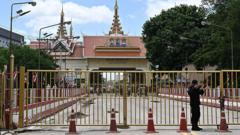In a startling turn of events, the Dutch government has collapsed just under a year since its formation, triggered by Geert Wilders’ withdrawal of support for his far-right Freedom Party (PVV). Prime Minister Dick Schoof announced on Tuesday his intentions to resign and submit the cabinet's resignation to King Willem-Alexander by day's end. During an emergency cabinet meeting, Schoof criticized Wilders' actions as “irresponsible and unnecessary,” reflecting the sudden crisis that has emerged.
Dutch Coalition Crumbles as Far-Right Leader Pulls Support

Dutch Coalition Crumbles as Far-Right Leader Pulls Support
The Dutch government faces a significant upheaval following Geert Wilders' departure from the ruling coalition, raising questions about the future political landscape.
Wilders, declaring his ambitions to lead the Netherlands, had previously outlined demands aimed at tightening asylum policies, including a freeze on new asylum applications and restrictions on family reunifications. His withdrawal came after a brief coalition meeting, where he reportedly walked out due to dissatisfaction with his party’s proposals. This abrupt move has left coalition partners, including the conservative-liberal VVD and the Farmers' Citizen Movement (BBB), expressing shock and anger, accusing Wilders of fabricating the crisis for political gain.
The collapse has arisen in a politically charged environment, with a NATO summit approaching in The Hague. While Schoof’s government may operate in a caretaker capacity until new elections are scheduled, the implications for the political landscape are profound. Analysts speculate that Wilders may center his election efforts on immigration issues, seeking to regain support lost in recent polls.
Critics, including VVD leader Dilan Yesilgoz, labeled Wilders’ decision as detrimental, arguing that asylum-related policy proposals were indeed aligned with the coalition’s broader goals. Meanwhile, economist Sandra Phlippen suggested the immediate economic impact would be minimal, citing the government’s lack of decisive planning over its brief tenure.
Amid the chaos, opposition parties have declared the collapse a release from what they called a "political hostage situation." As the situation unfolds, observers are keenly watching to see if Wilders' strategy will resonate with voters in the upcoming elections.
This sudden political shift serves as a reminder of the volatility in European politics, especially concerning immigration policies, as nations grapple with rising far-right sentiments.
Additional reporting by Anna Holligan in The Hague.
The collapse has arisen in a politically charged environment, with a NATO summit approaching in The Hague. While Schoof’s government may operate in a caretaker capacity until new elections are scheduled, the implications for the political landscape are profound. Analysts speculate that Wilders may center his election efforts on immigration issues, seeking to regain support lost in recent polls.
Critics, including VVD leader Dilan Yesilgoz, labeled Wilders’ decision as detrimental, arguing that asylum-related policy proposals were indeed aligned with the coalition’s broader goals. Meanwhile, economist Sandra Phlippen suggested the immediate economic impact would be minimal, citing the government’s lack of decisive planning over its brief tenure.
Amid the chaos, opposition parties have declared the collapse a release from what they called a "political hostage situation." As the situation unfolds, observers are keenly watching to see if Wilders' strategy will resonate with voters in the upcoming elections.
This sudden political shift serves as a reminder of the volatility in European politics, especially concerning immigration policies, as nations grapple with rising far-right sentiments.
Additional reporting by Anna Holligan in The Hague.





















